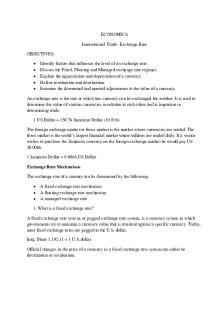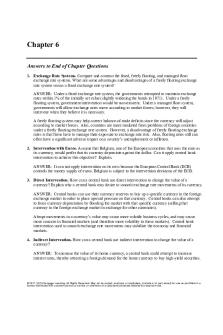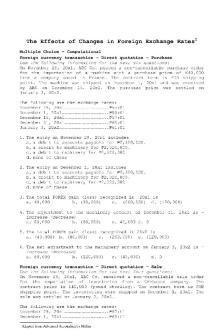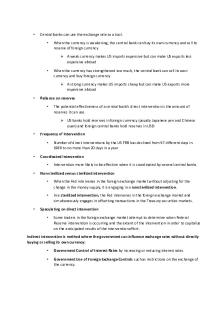Exchange Rates - economics notes PDF

| Title | Exchange Rates - economics notes |
|---|---|
| Course | Csec Economics |
| Institution | StuDocu University |
| Pages | 4 |
| File Size | 69.2 KB |
| File Type | |
| Total Downloads | 132 |
| Total Views | 327 |
Summary
ECONOMICSInternational Trade- Exchange RateOBJECTIVES: Identify factors that influence the level of an exchange rate. Discuss the Fixed, Floating and Managed exchange rate regimes. Explain the appreciation and depreciation of a currency. Define revaluation and devaluation. Examine the downw...
Description
ECONOMICS International Trade- Exchange Rate OBJECTIVES:
Identify factors that influence the level of an exchange rate. Discuss the Fixed, Floating and Managed exchange rate regimes. Explain the appreciation and depreciation of a currency. Define revaluation and devaluation. Examine the downward and upward adjustments to the value of a currency.
An exchange rate is the rate at which one currency can be exchanged for another. It is used to determine the value of various currencies in relation to each other and is important in determining trade. 1 US Dollar = 150.76 Jamaican Dollar (19 Feb) The foreign exchange market or forex market is the market where currencies are traded. The forex market is the world’s largest financial market where trillions are traded daily. If a visitor wishes to purchase the Jamaican currency on the foreign exchange market he would pay US $0.0066. 1 Jamaican Dollar = 0.0066 US Dollar Exchange Rate Mechanisms The exchange rate of a country can be determined by the following:
A fixed exchange rate mechanism A floating exchange rate mechanism A managed exchange rate
1. What is a fixed exchange rate? A fixed exchange rate system, or pegged exchange rate system, is a currency system in which governments try to maintain a currency value that is constant against a specific currency. Today, most fixed exchange rates are pegged to the U.S. dollar. Iraq: Dinar 1,192.11 = 1 U.S. dollar Official changes in the price of a currency in a fixed exchange rate system can either be devaluation or revaluation.
Devaluation is when the price of the currency is officially decreased in a fixed exchange rate system (downward movement in value) making it less expensive on the foreign exchange market. 1 US $ = JA $140 moves to 1 US $ = JA $145 OR $1 JA = $0.06 US moves to $1 JA = US 0.04 Local residence now pay more for foreign currency and the JA$ is worth less. Revaluation is the official increase in the price of the currency within a fixed exchange rate system (upward movement in value) making it more expensive on the foreign exchange market. 1 US $ = JA $145 moves to 1 US $ = JA $140 OR $1 JA = $0.04 US moves to $1 JA = US 0.06 Local residence now pay less for foreign currency and the JA$ is worth more. 2. Floating Exchange Rate
Floating exchange rate system means that the exchange rate is allowed to fluctuate according to the market forces without the intervention of the Central bank or the government. The demand for currency in three ways:
Locals may wish to buy imports/foreigners exports of a country Foreigners may wish to visit the country/ locals wish to visit a foreign country Foreigners may wish to invest in the country / locals may wish to invest in a foreign country
At a low price, more of the currency is demanded while at a high price, less of the currency is demanded. A rise in demand for Pound Sterling has led to an increase in the value of the £ to $ from: £1 = $1.50 to £1 = $1.70 Currency appreciates when its value increases with respect to the value of another currency or a “basket” of other currencies. Currency depreciates when its value falls with respect to the value of another currency or a basket of other currencies.
Managed Exchange Rates Under the managed exchange rate system, the exchange rate is predominantly determined in the foreign exchange market by supply of and demand for a currency. The government intervenes only occasionally to influence the exchange rate when it considers it to be necessary. Frequent changes in the exchange rate, if it is completely freely floating, may cause uncertainty for businesses, which is not good for trade, and so governments will be forced to intervene in order to stabilize the exchange rate. The most common systems are where central bank will set an upper and lower exchange rate value and then allow the currency to float freely, so long as it does not move out of that band. JA $145 < US $1 < JA $ 150 If the exchange rate starts to get close to the upper or lower level, then the central bank will intervene in the foreign exchange market for its currency. Central banks do not make the upper and lower level values public, for fear of speculation, but they do exist. Factors that Influence the Exchange Rate The factors that affects the demand and supply of the currency and therefore influence the exchange rate:
Domestic prices compared to foreign prices. If local prices are low compared with foreign prices, then residents and foreigners will buy more domestic goods. There will be a currency appreciation. If local prices are high compared with foreign prices, then residents and foreigners will buy more foreign goods. There will be a depreciation of the currency. Domestic income levels. If domestic income levels are increasing, ceteris paribus, residents might purchase more imports, which will cause the exchange rate to depreciate. On the other hand, falling incomes will reduce the demand for imports and the currency will appreciate. There is a general rule in economics that, as incomes increase, consumption of all goods (including imports) increases and diminishing incomes will lead to a reduction in consumption. Changing tastes. If tastes change in favour of the products of foreign countries, then there will be more imports and the currency will depreciate. Many countries owe the depreciation of their currency to the high level of preference for imports by their residents. We all enjoy clothes and shoes from abroad, as well as electronic gadgets and appliances. If tastes change in favour of the domestic product, then imports will decrease and the currency will appreciate. Speculation. Speculators are people who buy and sell currencies in order to make a profit. They might buy US$ when the dollar is cheap and sell when it commands a higher
price. In so doing, they make a profit. Speculators also operate according to what they believe will happen. If speculators think Jamaican interest rates will do up, they will purchase Jamaican dollars to earn the higher interest. As they buy more Jamaican dollars (causing demand for them to increase), the currency will appreciate. Interest rate changes. As interest rates increase and become higher than those of other countries, foreign currencies might flow into the country to take advantage of the high rates of interest. This causes an appreciation of the currency. As interest rates fall and become lower than those of other countries, foreign currencies might flow out of the country to take advantage of the high rates elsewhere. This causes a depreciation of the currency....
Similar Free PDFs

Exchange Rates - economics notes
- 4 Pages

Inflation, Exchange & Interest Rates
- 14 Pages

Economics Notes
- 17 Pages

Economics Notes
- 106 Pages

Economics notes
- 84 Pages

Economics notes
- 23 Pages
Popular Institutions
- Tinajero National High School - Annex
- Politeknik Caltex Riau
- Yokohama City University
- SGT University
- University of Al-Qadisiyah
- Divine Word College of Vigan
- Techniek College Rotterdam
- Universidade de Santiago
- Universiti Teknologi MARA Cawangan Johor Kampus Pasir Gudang
- Poltekkes Kemenkes Yogyakarta
- Baguio City National High School
- Colegio san marcos
- preparatoria uno
- Centro de Bachillerato Tecnológico Industrial y de Servicios No. 107
- Dalian Maritime University
- Quang Trung Secondary School
- Colegio Tecnológico en Informática
- Corporación Regional de Educación Superior
- Grupo CEDVA
- Dar Al Uloom University
- Centro de Estudios Preuniversitarios de la Universidad Nacional de Ingeniería
- 上智大学
- Aakash International School, Nuna Majara
- San Felipe Neri Catholic School
- Kang Chiao International School - New Taipei City
- Misamis Occidental National High School
- Institución Educativa Escuela Normal Juan Ladrilleros
- Kolehiyo ng Pantukan
- Batanes State College
- Instituto Continental
- Sekolah Menengah Kejuruan Kesehatan Kaltara (Tarakan)
- Colegio de La Inmaculada Concepcion - Cebu









